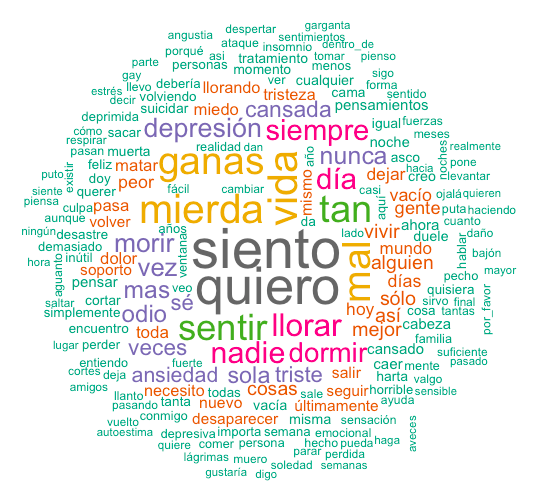Patterns in tweets in Spanish identified that may point to signs of depression
Patterns in tweets in Spanish identified that may point to signs of depression

Researchers of the Biomedical Informatics Research Programme (GRIB) at Pompeu Fabra University (UPF) and of the Hospital del Mar Medical Research Institute (IMIM) have identified behavioural features and patterns in tweets that may point to signs of depression. The study by the Integrated Biomedical Informatics research group, published in Journal of Medical Internet Research, is the first of its kind to analyse tweets in Spanish.
Depression is a complex disease and its detection is often hindered, complicating diagnosis and treatment, hence the need for new strategies to help with the diagnosis and follow up of the disorder.
The popularity of social networks like Twitter presents new opportunities for the detection of depression as they are a reflection of people’s everyday thoughts and feelings. In this way, social networks have become an important source of information related to health, allowing us to detect and predict affective disorders and they can be used as an additional tool for the monitoring and surveillance of mental health.
Social networks have become an important source of information related to health, allowing us to detect and predict affective disorders and they can be used as an additional tool for the monitoring and surveillance of mental health.
This study, coordinated by Ferran Sanz, analysed the linguistic patterns and the behavioural characteristics of Twitter users who suffer depression compared with the general population of twitterers.
They analysed various features of the messages, such as the number and frequency of tweets, their distribution throughout the day or during the night, and their seasonal nature. Thus, they have found that Twitter users who potentially suffer from depression globally modify the main features of their language, regardless of whether or not the tweets are related with the expression of depression.
“We found that users suffering depression are more active on Twitter at night and at weekends compared to others”, says Angela Leis, predoctoral researcher and first author of the work. This could be explained as a result of insomnia, one of the most common symptoms of depression. She adds that “they usually interact less with other users, retweeting less often and using shorter texts”. Also, “their vocabulary is characterized by a greater focus on themselves with a less varied writing style in which words of suicidal ideation often appear, with an abundance of negatively charged words, and the frequent appearance of emotions such as sadness, anger and revulsion”.
Twitter users who potentially suffer from depression globally modify the main features of their language, regardless of whether or not the tweets are related with the expression of depression.
Ferran Sanz explains that “Twitter users suffering depression therefore modify the way they express themselves on social networks and reflect changes in their behavioural patterns, and so it can be established as a tool to help in the detection and monitoring of mental illness”. This confirms and extends the results obtained by studies of tweets in English.
“Even though the analysis of tweets as a way to determine the existence of depression cannot be used as a replacement for diagnosis, it has potential as a complementary tool for detecting depressive disorders, at a lower cost than other traditional methods”, says Ferran Sanz, full professor of Experimental and Health Sciences (DCEXS) at UPF and director of the IMIM’s Biomedical Informatics Research Programme.
The research also involved GRIB researchers Francesco Ronzano, Miguel A. Mayer and the coordinator of the Integrated Biomedical Informatics group, Laura I. Furlong.
Reference articleArticle de referència:
Leis A, Ronzano F, Mayer MA, Furlong LI, Sanz F. Detecting Signs of Depression in Tweets in Spanish: Behavioral and Linguistic Analysis. J Med Internet Res 2019;21(6):e14199. DOI: 10.2196/14199.